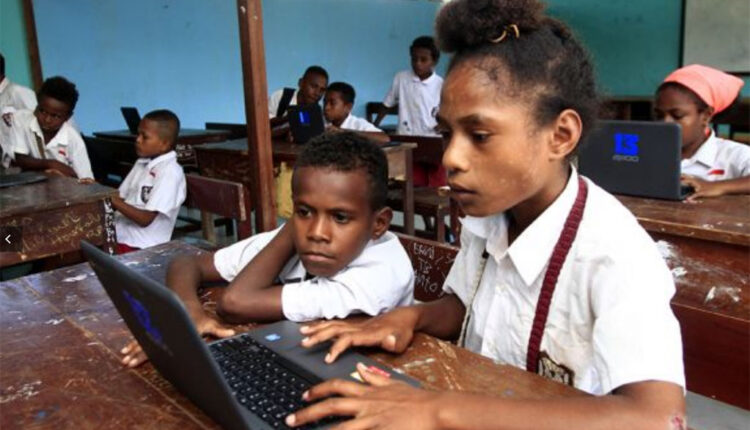
Supporting the Government’s Commitment to Guarantee Free Education for Papuan Children
As a significant step towards social justice and national development as stated in the 5th Pancasila Principle, the Government has promised and implemented free education for children in Papua. This commitment is packaged within an affirmative policy framework and broader national integration efforts, aimed at overcoming gaps and encouraging improvements in the socio-economic sector in every region of Indonesia. This initiative is not only a historical milestone in the field of education but also a basis for fostering national unity, reducing poverty and ensuring sustainable development.
The government’s commitment to free education for Papuan children aims to address regional disparities. This initiative includes the provision of free schooling from primary to secondary levels, with additional support for higher education through scholarships and other financial aid. This is manifested through the Affirmation of Secondary Education (ADEM) and Affirmation of Higher Education (ADIK) programs, the Special Autonomy (Special Autonomy) scholarship, and the Smart Indonesia Card (KIP).
This policy framework also includes infrastructure development, teacher training programs, and the integration of culturally relevant curricula to ensure that education in Papua is accessible and inclusive.
Minister of Education, Culture, Research and Technology, Nadiem Anwar Makarim, said that this is clear evidence of providing wider, more equitable and real access for all students in every corner of Indonesia, that every Indonesian child from various backgrounds has the right to receive quality and sustainable education. It is hoped that Papuan children who have received educational assistance will be enthusiastic to contribute and make changes on the Earth of Cenderawasih.
To ensure the success of this initiative, the government has adopted a multi-pronged approach. First, infrastructure development. Significant investment is being made to build and improve the quality of schools, especially in remote and rural areas. This includes building new schools, renovating existing schools, and providing important facilities such as libraries, laboratories, and sports facilities.
Second, teacher training and recruitment. Recognizing the important role of educators, the government focuses on training and recruiting quality teachers. Special incentives are offered to encourage teachers to work in Papua, and professional development programs to improve skills and adapt teaching methods to the local context.
Indonesian Vice President Ma’ruf Amin as Chair of the Steering Committee for the Acceleration of Special Autonomy for Papua (BP3OKP) is very concerned with efforts to create superior human resources in Papua through providing Baznas Scholar scholarships to Papuan teachers. According to him, improving the quality of teachers and lecturers is one of the main keys in developing education in Papua.
Third, curriculum and cultural integration. The curriculum is adapted to reflect the cultural and linguistic diversity of Papua. This involves incorporating local languages and cultural studies into educational programs, thereby fostering a sense of identity and belonging among Papuan children.
Fourth, community involvement and support. The success of educational initiatives relies heavily on community involvement. The government works closely with local communities, tribal leaders, and NGOs to ensure that education policies are implemented effectively and are culturally sensitive.
The government’s commitment to free education for Papuan children has the potential for a transformative impact. One example is in terms of socio-economic improvement. Education is a powerful tool to break the cycle of poverty. By providing free education, the government equips Papuan children with the knowledge and skills needed to gain better job opportunities and improve their socio-economic status.
Apart from that, the realization of national unity and integration. Promoting education in Papua contributes to national unity by addressing regional disparities and fostering a sense of belonging among Papuan people. This helps bridge the gap between Papua and other regions, as well as encourage a more inclusive and cohesive national identity.
Likewise with the realization of cultural preservation and awareness. Integrating local culture into the education curriculum helps preserve and promote Papuan heritage. This ensures that children grow up with a strong sense of identity and pride in their cultural roots, while being equipped to participate in the wider national and global community.
And last but not least, it is related to sustainable development. Education is vital for sustainable development because an educated society will be better prepared to engage in sustainable practices, participate in democratic processes, and contribute to the region’s overall development. The Government’s commitment to implementing development in Papua has resulted in a sense of satisfaction among the Papuan people.
General Chair of the Papuan Young Exponents, Rahman Fatur, said that President Jokowi in his government was effective in developing Papua, and that was what was felt and also in reality on the ground. According to him, Jokowi is running an extraordinary government in development in the education, health, infrastructure, economic and other sectors in Papua. This development even reached inland areas.
The Indonesian government’s promise to provide free education for Papuan children is an important initiative that addresses historical gaps and paves the way to a brighter future. Although challenges remain, the potential benefits of this policy are enormous, providing hope for socio-economic improvement, national unity, cultural preservation, and sustainable development.
By investing in public education, Indonesia is taking an important step towards a more just and prosperous future for all its citizens. The success of this initiative will depend on continued commitment, effective implementation, and active involvement of all stakeholders, including government, local communities, and international partners.